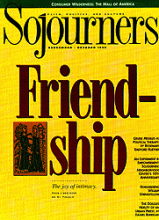For those who fell back asleep after New Jack City, took a nap after Boyz N the Hood, or hid under the covers after the Los Angeles rebellion, the snooze alarm has just gone off. In Menace II Society, 21-year-old twin brothers Allen and Albert Hughes (with 24-year-old writer Tyger Williams) have given us a captivating, skillfully made film, and the most realistic picture to date of life in our country's urban war zones.
Menace II Society is not a film in which America's urban crisis is solved, everyone is saved, and audiences' hearts are warmed in the end. The mission of these young directors is to "come at us" with some reality. The viewer is left with the daunting challenge--and responsibility--of seeking applicable meaning, answers, and actions.
Briefly establishing the history of the riots of the 1960s and the subsequent drug culture that developed in the '70s, Menace II Society is set in the Watts neighborhood of Los Angeles in 1993. The film follows the life of a young brother named Caine (presumably named after the vice that led to the early death of his parents) and his homeys through one summer in the 'hood, where "you never knew what was gonna happen or when."
LIKE PROTAGONISTS IN other recent 'hood genre films, Caine straddles the fence between choices for daily and long-term survival. On one side are friends like O-Dog, who Caine--the narrator throughout the film--describes as "America's nightmare...young, black, and doesn't give a f--."
It is with O-Dog that Caine first becomes an accomplice to murder, and then a murderer himself, as the two become trapped in the retaliatory "eye for an eye" mentality that fuels much of the black-on-black and gang violence plaguing our cities.
Read the Full Article

